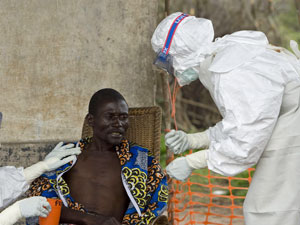

Recognising the threat that Ebola Virus Disease (EVD) outbreaks present to its customers and their guests, staff, patients and visitors, Diversey Care has taken steps to address this outbreak with a ‘portfolio’ of important resources available online.
www.diversey.com/ebolaoutbreak/available-material
‘Our commitment to a cleaner, healthier future is reflected in the support that we provide to help you minimise this risk, and maintain a safe facility,’ states Diversey Care.
The company is proffering various initiatives to help address the EVD outbreak in West Africa and beyond.
They include training for employees on best practices for cleaning and disinfection; recommending actions on how to respond to an outbreak; and emphasising the importance of hand hygiene to prevent spread of EVD.
Diversey is providing a list of products that it offers, which are likely to be effective against EVD based on the US’s CDC (Center for Disease Control & Prevention) guidelines; launching a social media campaign to inform and educate its customers with daily updates; and publishing blogs to increase awareness.
Diversey Care infection prevention experts are available to consult with customers and assist in the implementation of programs to manage risk of infection.
To contain the EVD outbreak, the CDC recommends a registered disinfectant capable of killing small non-enveloped viruses. As these viruses are harder to kill, a product that can kill these would also be likely to kill the Ebola virus.
![Oxivir Tb Wipes [Aust R 164850]](http://13.239.37.98/wp-content/uploads/2014/09/Diversey_Ebola_Healthcare_3.jpg)
‘Oxivir Tb is efficacious against non-enveloped viruses and therefore meets the CDC guidelines for disinfecting environmental surfaces in rooms of patients or guests with suspected or confirmed Ebola virus infection.’
The CDC guideline can be found at: www.cdc.gov/vhf/ebola/hcp/environmental-infection-control-in-hospitals.html
What is Ebola?
The Ebola virus is an enveloped virus that causes Ebola Virus Disease (EVD). First appearing in 1976, outbreaks thus far have occurred only in Africa. The manner in which the virus appears is not firmly established, however, best evidence to date suggests that the virus lives in fruit bats.
Contact with an infected animal (a bite or contact with bodily secretions or organs) causes the initial transmission from animals to people. Human to human transmission can occur through direct contact with the blood or body fluids of an infected person, or direct contact with objects that have been contaminated with infected secretions. The virus enters the body through broken skin or mucous membranes.
Transmission
EVD is not believed to be transmitted by air, water, or cooked food. Consumption of raw milk, raw meat, or raw organs of an infected animal is believed to be a potential source of infection for people. All food (especially meat) should be thoroughly cooked to prevent any risk of transmission.
Previous EVD outbreaks have spread to the family and friends and Healthcare workers of the infected people. Transmission is believed to occur through close contact with infection secretions while caring for a sick person or handling of the body after death, causing similar exposure to infected bodily fluids. Human to human transmission is believed to occur through:
* Contact with blood or secretions of an infected person (direct contact) either while an infected person is alive, or after death.
* Exposure to contaminated needles, bandages, clothing, or other infected objects (indirect contact) in the environment.
Contagiousness
While an infected person must have symptoms of EVD to be contagious, people who recover from EVD can still transmit the Ebola virus for an unknown period of time through body fluids after symptoms have stopped. Persons are considered infectious as long as their blood or body fluids contains the virus, which can be up to eight weeks based on limited evidence from past outbreaks.